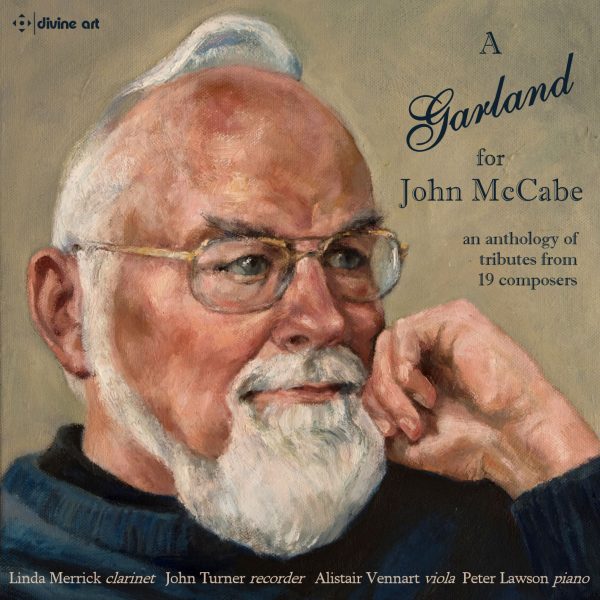The Clarinet
John McCabe (1939-2015) was a distinguished English pianist, composer and writer on music. His compositional output was sizable, specializing in concerti and chamber music. There was a special affinity for the clarinet in his catalog: no less than ten chamber works included clarinet, in addition to an unaccompanied piece and a clarinet concerto.
It is through this lens that we are appreciative of all the composers associated with A Garland for John McCabe, an anthology of tributes from 19 composers to the memory of McCabe. Of the 19 works on the album, 12 feature the clarinet. The instrumentation varies within the quartet of instruments: clarinet, recorder, viola and piano. None of the works are longer than 6 minutes and 20 seconds, excellent for inclusion on concerts of any length.
Peter Dickinson’s rag for the quartet is a charming minor-key take on the genre. The pieces on this album utilizing both recorder and clarinet prove to be a viable pairing, especially the low clarinet in octaves with the thinner recorder. Saxton’s Prelude is based on the upper case letters of McCabe’s name. The intricate counterpoint arrives at a satisfying conclusion. Highland Song by Howard Skempton, for recorder, clarinet and viola, evokes the Scottish soundscape of that region. A lovely clarinet soliloquy is followed by a pastoral trio. The clarinet and viola duet that concludes the piece is expertly wrought.
Elis Pehkonen’s Lament for the Turtle-Dove is based on one of his favorite medieval plainchant melodies, Benedicamus Domino. Inspired by the birds in and around Pehkonen’s garden, Lament is set as a theme and variations. This performance highlights delicate, crystalline piano playing, showcasing the contrasting shades of the ensemble. Lament is an exquisite piece and one of the highlights of the album. Robin Walker’s quartet is, in a sense, a prequel. The title is the opening question, answered by the melody of the 1930s song I’ll Walk Beside You. The viola and recorder combination lends itself to pastoral country scenes. This quartet evokes that spirit beautifully. In Memoriam John McCabe for clarinet, viola and piano by Malcolm Lipkin is the first work with clarinet on this album that incorporates a theme from a Haydn piano sonata. McCabe was the first pianist to record all of Haydn’s piano sonatas.
Rob Keeley’s Elegy for clarinet and piano is another tribute based on the letters of McCabe’s name. Angular and prickly, the clarinet attempts to soften the edges with some fine legato playing. The “changes” implied in James Francis Brown’s Evening Changes for recorder, clarinet and viola are primarily stylistic, with a medieval tinge leading to a more contemporary, cadenza-infused finale. Kudos to John Turner, recorder, for some excellent multiple articulation work.
Gunning’s Dance of the Ants for recorder, clarinet and piano is as bouncy and charming as its title. This piece is infused with a happy counterpoint brimming with sunshine. John Turner’s technical command on this piece is excellent, notably his ascending leaps. David Matthews’ Chaconne for clarinet, viola and piano is a peaceful meditation on McCabe’s life in music, as well as a fine addition to the terrific repertoire of clarinet, viola and piano.
Howard’s Outback, for recorder, clarinet, viola and piano, references the Australian landscape of which McCabe was so fond. Sparse, angular textures predominate. For those of us that enjoy single malt whiskies (and the rare bass clarinet sighting), Edradour for recorder, clarinet, viola and piano is right up our alley. Gary Carpenter serves up an energetic quartet in honor of one of McCabe’s favorite beverages.
Linda Merrick, noted recording artist and principal tutor at the Royal Northern College of Music in Manchester, performs splendidly. This album is a fitting remembrance for one of England’s finest musicians.
@divineartrecordingsgroup
A First Inversion Company
Registered Office:
176-178 Pontefract Road, Cudworth, Barnsley S72 8BE
+44 1226 596703
Fort Worth, TX 76110
+1.682.233.4978












